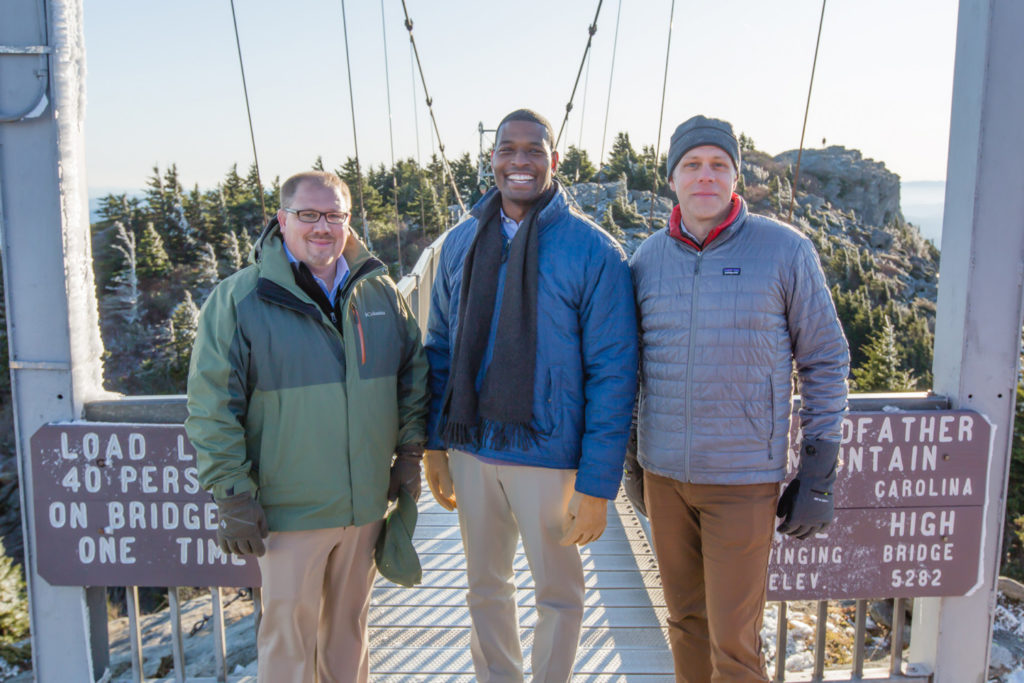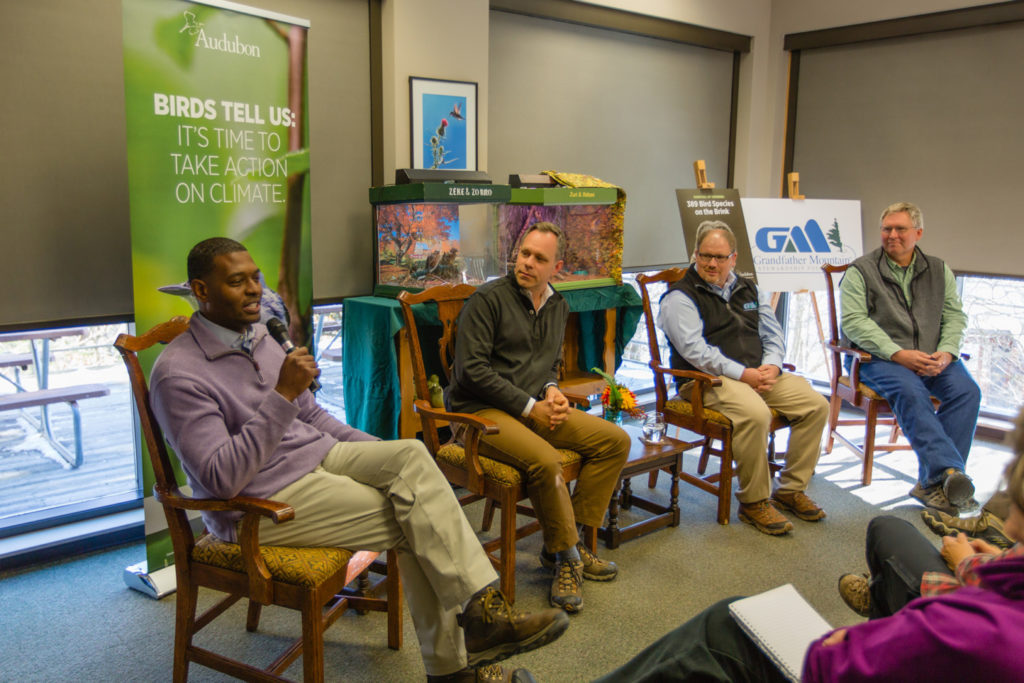 Dozens of nature lovers and bird advocates braved the wintry weather Wednesday to hear officials from Audubon North Carolina and Grandfather Mountain talk with N.C. Department of Environmental Quality Secretary Michael S. Regan about the climate challenges facing wildlife and plant communities in the North Carolina mountains.
Dozens of nature lovers and bird advocates braved the wintry weather Wednesday to hear officials from Audubon North Carolina and Grandfather Mountain talk with N.C. Department of Environmental Quality Secretary Michael S. Regan about the climate challenges facing wildlife and plant communities in the North Carolina mountains.
For many bird species, the high-elevation western part of the state holds critical habitat, but these species also face unique climate threats, the speakers said. A new climate report by Audubon, called Survival by Degrees, found that more than 200 bird species in North Carolina are threatened with extinction because of rising temperatures and more extreme weather, and the majority of breeding species at risk are native to western North Carolina.
The list includes iconic and beloved birds like the Wood Thrush, Northern Saw-whet Owl, Ruffed Grouse, Canada Warbler and 20 other warbler species. Native plants face similar threats, including distinctive and important plant communities like beech and hemlock cove forests.
Officials spoke at the Nature Museum at Grandfather Mountain, touching on the diverse ecosystems of the northwestern mountains and the importance of addressing climate threats by protecting land and promoting clean energy.
“A great way to look at the vast diversity of Grandfather Mountain is through our birds,” said Jesse Pope, president and executive director of the Grandfather Mountain Stewardship Foundation, the nonprofit organization that owns and operates the Linville nature park. “We have around 130 species of birds that nest here each year. The highest elevation bird species are the ones most sensitive to changes in our climate and weather. At this point in Grandfather Mountain’s history, this issue, perhaps, poses the greatest threat to the myriad of flora and fauna that make this mountain special.”
Pope noted that the foundation’s priority is conservation education, and making the public aware of such issues is paramount to its mission.
 “Grandfather Mountain is a natural treasure because of its sweeping views and unique plant and animal life, but many of the bird species and underlying ecosystems that make this place special are at risk,” said Andrew Hutson, Audubon North Carolina executive director and National Audubon Society vice president. “More than half of the breeding birds in North Carolina threatened by changes to our climate can be found here. The good news is Audubon’s science shows us there is still time to act, but that means taking bold action. Protecting and managing habitat is critical, but we also need to move our state forward on clean energy with bipartisan policy.”
“Grandfather Mountain is a natural treasure because of its sweeping views and unique plant and animal life, but many of the bird species and underlying ecosystems that make this place special are at risk,” said Andrew Hutson, Audubon North Carolina executive director and National Audubon Society vice president. “More than half of the breeding birds in North Carolina threatened by changes to our climate can be found here. The good news is Audubon’s science shows us there is still time to act, but that means taking bold action. Protecting and managing habitat is critical, but we also need to move our state forward on clean energy with bipartisan policy.”
“We’re seeing the impacts of our changing climate across the state—pressures on bird populations, mudslides in Western North Carolina and impacts to our coastal communities and economies,” Secretary Regan said. “We all have a voice, we all need to pay attention to what the science is telling us. We all need to take action to mitigate and adapt to climate change impacts. In addition to protecting and managing habitat, we can reduce carbon emissions by advocating for clean energy in our own communities and at the state level.”
After the discussion, attendees at the event ventured outside to see first-hand Grandfather Mountain’s unique ecology and the plant and animal life at risk. Grandfather Mountain spans approximately 3,200 acres, including 16 distinct ecological communities and 72 endangered species.
Hundreds of species of plants and animals call Grandfather Mountain home. While some are commonly found and admired, others are rare — not only in North Carolina, but throughout the world. Since Grandfather is an extraordinarily rugged mountain with more exposed rocks and crags than any other mountain in the Southern Appalachians, its position, unusual height, soil types, vegetation density, moist cool climate and other features combine to produce a mosaic of specialized habitats.
“On a hike from Grandfather Mountain’s lowest elevations to its peaks, you’ll find all the life zones typically seen on a drive from Georgia to Canada,” Pope said.
About Audubon
The National Audubon Society protects birds and the places they need, today and tomorrow, throughout the Americas using science, advocacy, education and on-the-ground conservation. Audubon North Carolina, a state program of the National Audubon Society, has offices in Durham, Boone, Corolla and Wilmington. Learn more at www.nc.audubon.org, on Twitter at @audubonnc, and on Instagram at @audubon_nc.
About the Grandfather Mountain Stewardship Foundation
The not-for-profit Grandfather Mountain Stewardship Foundation strives to inspire conservation of the natural world by helping guests explore, understand and value the wonders of Grandfather Mountain. For more information, call 800-468-7325, or visit www.grandfather.com to plan a trip.

